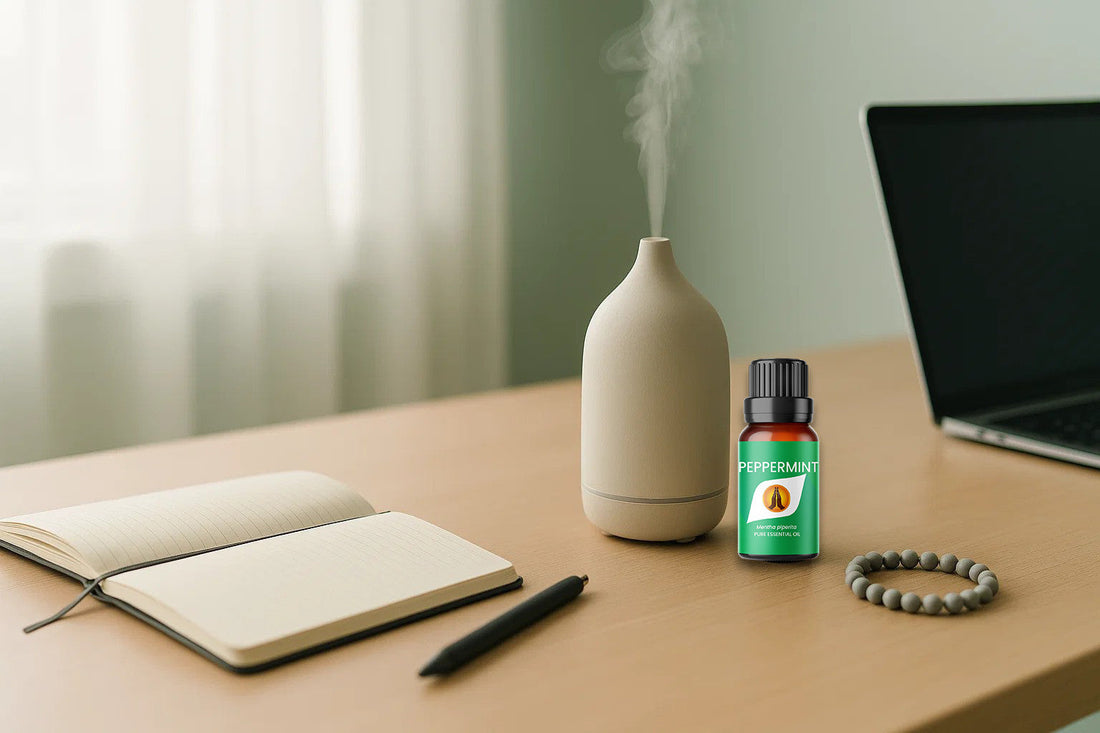
Essential Oils for Concentration & Study: Natural Ways to Stay Focused
Share
Struggling to concentrate during long study sessions or work tasks? You’re not alone. Whether it's brain fog, stress, or just plain distraction, staying focused can be tough. While caffeine and productivity hacks are common go-tos, many are turning to aromatherapy as a natural way to support mental clarity and alertness.
Certain essential oils may help enhance focus, reduce mental fatigue, and create an environment more conducive to deep thinking. This blog explores which oils are best, how to use them safely, and what the science says—using cautious, well-researched claims and UK-based guidance. Let’s dive in.
Why Use Essential Oils for Focus and Study?
Essential oils work through aromatherapy, where scent molecules travel from your nose to the brain’s limbic system—an area linked to emotion, memory, and attention. Some essential oils have been studied for their potential to improve cognitive performance, including alertness, recall, and reaction time.
Research shows that oils like rosemary, peppermint, and lemon may support mental sharpness during tasks that require focus or memory. These effects vary from person to person, but many users report a clearer mind and improved ability to concentrate—especially when used consistently in a calm setting.
Don’t want to mix your own? Try our ready-made Focus Life Essential Oil Blend—a synergy of frankincense, peppermint, and rosemary designed to support mental clarity.
Best Essential Oils for Concentration and Focus
When it comes to staying sharp naturally, these essential oils stand out. Each has been studied for its potential to support alertness, memory, or reduce mental fatigue. Here are some of the top picks:
Peppermint Oil – Invigorating and energising
Known for its fresh, minty aroma, peppermint oil may help reduce mental fatigue and improve alertness. One study found it could increase reaction speed during mentally demanding tasks.
→ Explore Peppermint Oil
Rosemary Oil – Memory support and clarity
Rosemary has been linked to improved memory and cognitive performance. In one UK study, higher levels of a compound called 1,8-cineole were associated with better accuracy and speed in mental tasks.
→ Try Rosemary Oil
Lemon Oil – Uplifting and mentally refreshing
Lemon essential oil is often used for its bright, clean scent that may support mental clarity and motivation. Some research suggests it can improve working memory and mood.
→ Discover Lemon Oil
Eucalyptus Oil – Crisp and awakening
This sharp, stimulating oil is often used alongside peppermint. It’s commonly used in blends for mental fatigue and to help clear the mind.
→ View Eucalyptus Oil
Spearmint Oil – Gentler mint for longer focus
Spearmint offers a softer mint aroma, making it a good alternative for those who find peppermint too strong. It’s often used in focus blends for sustained attention.
→ Check Spearmint Oil
How to Use Essential Oils for Studying and Focus
The way you use essential oils can affect how well they work for focus. These are the safest and most effective methods:
Inhalation (Recommended for Focus)
Inhaling essential oils is the fastest and safest way to support alertness. You can:
-
Use a diffuser during study sessions
-
Place a drop on a tissue or cotton pad near your desk
-
Try an aromatherapy bracelet for on-the-go use
→ Aromatherapy Bracelets
Topical Use (Use with Care)
For a more hands-on approach, oils can be applied to the skin—but must be diluted with a carrier oil. Stick to a 1% dilution: about 1 drop per teaspoon of carrier oil.
→ Jojoba Oil
→ Vitamin E Oil
→ All Carrier Oils
Test a small area before full application, and avoid using on sensitive areas or broken skin.
Rollerballs for Quick Use
Pre-diluted essential oil rollerballs can be applied to pulse points (wrists, temples, neck) before or during work sessions. They’re portable, easy to use, and safer for beginners.
→ Pulse Point Rollerballs

Do Fragrance Oils Help with Focus?
It’s easy to confuse fragrance oils with essential oils, but they serve very different purposes.
-
Essential oils are natural plant extracts with active compounds that may offer therapeutic benefits—such as supporting focus or reducing fatigue.
-
Fragrance oils, on the other hand, are primarily synthetic and designed purely for scent. They do not contain the active ingredients that give essential oils their potential cognitive or emotional effects.
That said, fragrance oils can still play a role in your study space. A pleasant aroma may lift your mood or create a more inviting atmosphere—even if it doesn’t directly impact focus. For example, a clean or energising scent might help signal “focus mode” when used consistently.
Just remember: if you're aiming for therapeutic benefits, choose pure essential oils over fragrances.
FAQs
What essential oils help with studying?
The most commonly recommended oils for focus are peppermint, rosemary, lemon, eucalyptus, and spearmint. These have been shown in studies to support alertness, memory, or mental clarity.
How do I use essential oils to improve concentration?
Inhalation is best—either via a diffuser, tissue, or aromatherapy bracelet. Topical use is also possible if diluted properly.
Is rosemary oil good for memory?
Yes—some research suggests that inhaling rosemary oil, particularly those high in 1,8-cineole, may support memory and task performance.
Are fragrance oils safe to use in diffusers?
Yes, but only for scent—not for therapeutic effects. Always check the label and use according to instructions.
Can children use essential oils for focus?
Use with caution. Stick to mild oils (e.g. lemon, spearmint) and always dilute well—less than 1% is advised for children. Consult a professional if unsure.
What’s the safest way to apply oils to skin?
Always dilute in a carrier oil (1% = ~1 drop per teaspoon of carrier). Do a patch test, avoid the eyes, and never apply undiluted oils directly to the skin.
Final Tips & Precautions
While essential oils may support mental clarity and focus, they’re not a quick fix. Their effects are subtle and best used as part of a healthy routine that includes rest, hydration, and good study habits.
Important safety notes:
-
Always dilute oils before applying to the skin. A safe dilution is 1%—about 1 drop of essential oil per teaspoon of carrier oil.
-
Avoid contact with eyes, mouth, and broken skin.
-
Diffuse in well-ventilated spaces and avoid overexposure.
-
Do not ingest essential oils.
-
Children, pregnant women, and people with medical conditions should consult a healthcare professional before use.
This blog is for informational purposes only and is not a substitute for professional medical advice.
Try Them for Yourself
Whether you're prepping for exams, reading, or pushing through work, essential oils may give you a natural edge in creating a focused and energised environment.
Start with our most popular focus oils:
→ Peppermint
→ Rosemary
→ Lemon
Or try our ready-made Focus Life Blend, crafted for clarity and mental boost.
Need something easy to apply? Our rollerballs and bracelets make aromatherapy simple, safe, and portable.
References
Here are some of the key studies and expert articles that support the information in this blog:
-
Study on rosemary and memory performance
In this study, researchers found that the compound 1,8-cineole in rosemary oil was linked to improved memory and alertness during mental tasks.
→ Read the rosemary and memory study -
Research on peppermint oil and mental fatigue
This clinical trial showed that peppermint essential oil may help reduce mental fatigue and improve performance on demanding cognitive tasks.
→ See the peppermint oil study -
Lemon essential oil and working memory
A recent human trial found that inhaling lemon essential oil significantly improved short-term memory and mental clarity.
→ View the lemon oil and memory trial -
Overview of how scents affect focus (aromachology)
Aromachology is the study of how smells influence emotions and cognitive function. This overview explains how certain scents may improve attention.
→ Learn more about aromachology -
General safety and essential oil usage guide
For safe use, essential oils should always be diluted before applying to the skin. This guide offers basic principles and best practices.
→ Read a general guide to using essential oils safely
Further Reading
Want to explore more ways to use essential oils in your daily life? Here are some related posts:
-
🧘♀️ Best Essential Oils for Focus and Productivity
Discover more oils and blends that may support a clear, motivated mindset. -
😴 Essential Oils for Sleep and Relaxation
Wind down after a long day of studying or working with calming oils. -
🧪 How Aromatherapy Affects Your Brain & Mood: The Science
Dive into the science behind how essential oils influence focus, memory, and emotion. -
🧼 Essential Oils in Baths: A Guide to Safe Usage, Benefits, and Best Practices
Learn how to use essential oils to recharge during study breaks. -
🧴 Your Guide to Carrier Oils: Benefits, Uses, and How to Choose the Best One
Not sure how to dilute essential oils safely? This guide explains everything.
Further Reading from Vita London
Looking to support your focus and mental clarity from the inside out? Our sister brand, Vita London, offers a range of supplements that may help you stay sharp and energised.
-
🧠 Best Brain Supplements for Focus & Mental Clarity
Explore top natural supplements for memory, attention, and daily cognitive support. -
💤 Sleep Better Naturally with Ashwagandha & Magnesium
Quality sleep is essential for mental focus—see how these supplements may help. -
⚡ Best Supplements for Energy and Tiredness
Struggling with brain fog or afternoon slumps? These can help combat fatigue naturally. -
🌿 Ashwagandha for Stress and Mental Balance
Chronic stress can hurt concentration—learn how ashwagandha may support calm focus. -
🧩 [What Vitamins Should Students and Adults Take Daily?]
For women →
For men →


